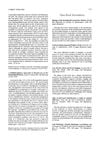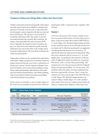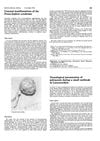 6 citations,
October 2013 in “Expert Review of Dermatology”
6 citations,
October 2013 in “Expert Review of Dermatology” Psychotropic medications can cause skin problems, including serious conditions, and patients should be monitored closely.
 24 citations,
January 2016 in “Lasers in Medical Science”
24 citations,
January 2016 in “Lasers in Medical Science” Erbium glass laser treatment may help with skin remodeling, reduce inflammation, and improve skin cell maturation.
 1 citations,
May 1999 in “Journal of Oral and Maxillofacial Surgery”
1 citations,
May 1999 in “Journal of Oral and Maxillofacial Surgery” Patients with mandible reconstruction had better quality of life and function than those with soft-tissue reconstruction.
 29 citations,
September 2014 in “American Journal of Dermatopathology”
29 citations,
September 2014 in “American Journal of Dermatopathology” Horizontal sections of scalp biopsies are good for diagnosing Central Centrifugal Cicatricial Alopecia and help customize treatment.
 25 citations,
January 2013 in “Journal of Industrial and Engineering Chemistry”
25 citations,
January 2013 in “Journal of Industrial and Engineering Chemistry” Some herbal extracts, especially when used in cubosomal suspensions, were as effective as Minoxidil in promoting hair growth.
 7 citations,
October 2017 in “Behavioural Pharmacology”
7 citations,
October 2017 in “Behavioural Pharmacology” Fluoxetine's effectiveness as an antidepressant in mice depends on a specific protein activity and a 5-minute pretest.
 9 citations,
October 2018 in “Journal of Cosmetic and Laser Therapy”
9 citations,
October 2018 in “Journal of Cosmetic and Laser Therapy” Using methods like lasers and microneedling with drugs can improve hair regrowth for alopecia, but more research is needed on safety and best practices.
 18 citations,
December 2016 in “Phytomedicine”
18 citations,
December 2016 in “Phytomedicine” Curcuma aeruginosa essential oil effectively reduces hair growth and lightens underarm skin.
3 citations,
October 2023 in “Cosmetics” Healthy lifestyle changes can significantly improve skin health as you age.
 December 2006 in “The Brown University Psychopharmacology Update”
December 2006 in “The Brown University Psychopharmacology Update” Second-generation antipsychotics offer no significant benefit over first-generation ones for schizophrenia.
26 citations,
December 2019 in “Indian Journal of Dermatology, Venereology and Leprology” PRP combined with minoxidil is the most effective and safe treatment for male pattern baldness.
 12 citations,
July 1979 in “International Journal of Dermatology”
12 citations,
July 1979 in “International Journal of Dermatology” A patient with zinc depletion improved after zinc supplementation during parenteral nutrition.
32 citations,
July 2017 in “Molecular diagnosis & therapy” MicroRNA-21 could help diagnose and treat skin fibrosis.
 38 citations,
March 2017 in “Expert Opinion on Investigational Drugs”
38 citations,
March 2017 in “Expert Opinion on Investigational Drugs” Bimatoprost is promising for treating some types of hair loss but needs more testing for androgenetic alopecia.
1 citations,
January 2022 in “Springer eBooks”  1 citations,
January 2015 in “Springer eBooks”
1 citations,
January 2015 in “Springer eBooks” Chemotherapy can cause skin side effects that affect patients' lives, but they can be managed to avoid interrupting cancer treatment.
 April 2018 in “Dermatologic Surgery”
April 2018 in “Dermatologic Surgery” A new surgical technique using vellus hair grafts effectively treated vitiligo without causing unwanted hair growth.
 October 2024 in “Journal of Education Health and Sport”
October 2024 in “Journal of Education Health and Sport” Alopecia areata treatment should be personalized, using topical or systemic therapies based on severity, with promising options like JAK inhibitors needing more research.
 23 citations,
April 2017 in “Clinical, Cosmetic and Investigational Dermatology”
23 citations,
April 2017 in “Clinical, Cosmetic and Investigational Dermatology” Dermatologists should screen for and manage psychological issues in patients with skin conditions to improve their quality of life.
 July 2021 in “IntechOpen eBooks”
July 2021 in “IntechOpen eBooks” Ginseng, especially its component ginsenosides, can promote hair growth, reduce hair loss, and potentially treat conditions like alopecia by affecting cell pathways and cytokines.
 25 citations,
October 1976 in “The BMJ”
25 citations,
October 1976 in “The BMJ” A woman showed neurological symptoms from psittacosis linked to bird exposure, improving after antibiotic treatment.
 4 citations,
March 2002 in “Journal of the American Pharmaceutical Association”
4 citations,
March 2002 in “Journal of the American Pharmaceutical Association” The conclusion is that pharmacists are important in helping women choose the right skin care treatments.
December 2022 in “Clinical, Cosmetic and Investigational Dermatology” Androgenetic alopecia negatively affects quality of life, especially in younger, less educated, single, and rural individuals.
 July 2023 in “JAAD International”
July 2023 in “JAAD International” Two drugs, finasteride and minoxidil, are approved for hair loss treatment, but new therapies are being developed.
5 citations,
October 2017 in “JOGC/Journal of obstetrics and gynaecology Canada” The conclusion is that proper diagnosis and long-term treatment, including medication, hair removal, and lifestyle changes, are important for improving hirsutism, especially in PCOS patients.
 36 citations,
September 2014 in “Paediatric drugs”
36 citations,
September 2014 in “Paediatric drugs” More pediatric-specific research and guidelines are needed to improve hidradenitis suppurativa treatment in children and adolescents.
 7 citations,
August 2006 in “Experimental Neurology”
7 citations,
August 2006 in “Experimental Neurology” Finasteride blocks deoxycorticosterone's anticonvulsant effects in infant rats, but indomethacin doesn't.
 212 citations,
September 2008 in “Journal of The American Academy of Dermatology”
212 citations,
September 2008 in “Journal of The American Academy of Dermatology” Minoxidil and finasteride treat hair loss in men, while minoxidil treats hair loss in women.
 38 citations,
July 2012 in “international journal of endocrinology and metabolism”
38 citations,
July 2012 in “international journal of endocrinology and metabolism” Some plant-derived compounds may help with hormonal conditions, but more research is needed to confirm their effectiveness.
 March 2024 in “Journal of Experimental & Biomedical Sciences/Biomedical Science Letters”
March 2024 in “Journal of Experimental & Biomedical Sciences/Biomedical Science Letters” BCC can protect heart cells from damage caused by oxidative stress.
























